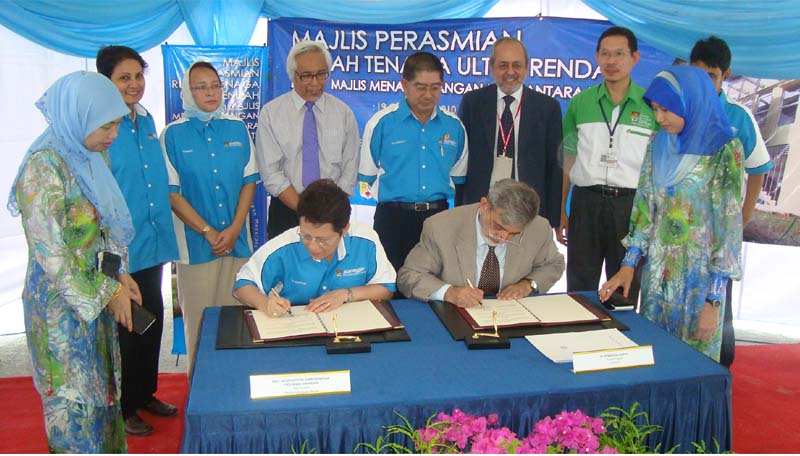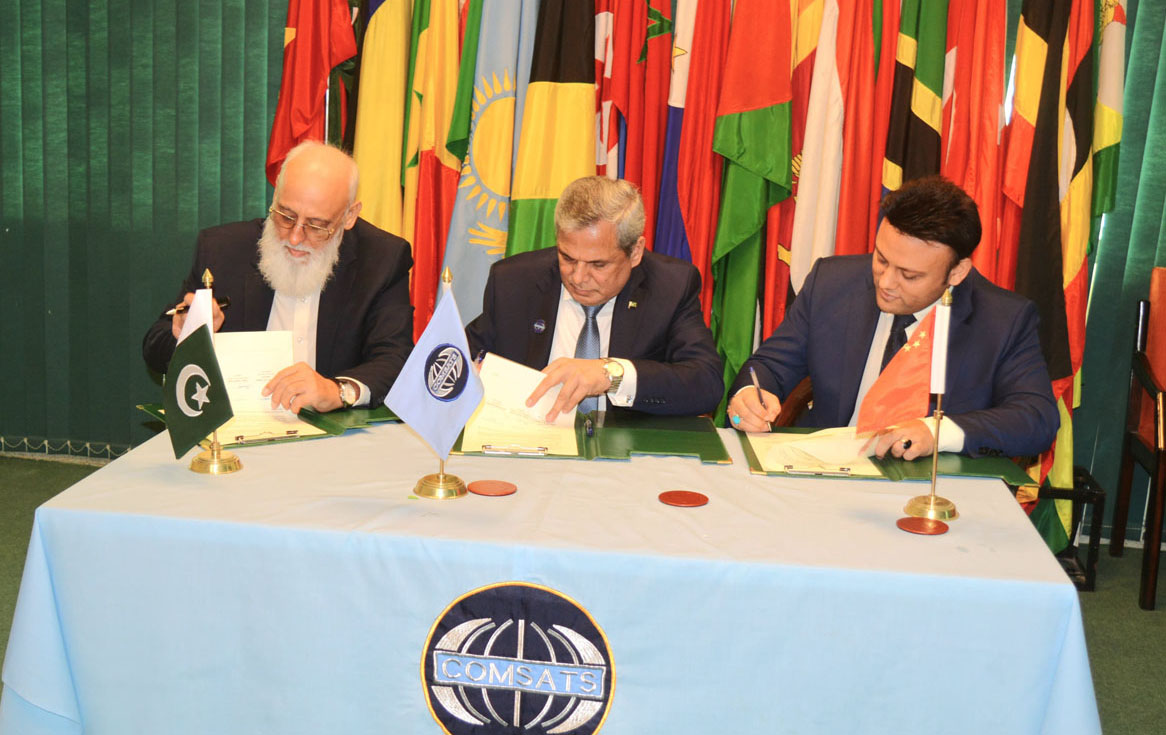A Memorandum of Understanding was signed between the Commission on Science and Technology for Sustainable Development in the South (COMSATS) and the Universiti Kabangsaan Malaysia (UKM) for cooperation in the field of renewable energy, on the 19th of October 2010. The MoU signing ceremony took place in conjunction with the inauguration of UKM’s ‘Ultra Low Energy House’ at the hands of H.E Y.B. Datuk Dr. Maximus Johnity Ongkili, the Minister of Science, Technology and Innovation (MOSTI), Government of Malaysia. The Minister also witnessed the signing of an MOU between UKM and COMSATS, to promote research and development in the field of renewable energy, with a view to benefit the common man and accelerate overall socio-economic progress in the developing countries.
Prof. Tan Sri Dato’ Dr. Sharifah Hapsah Syed Hasan  Shahabudin, the Vice-Chancellor UKM, and Dr. Imtinan Elahi Qureshi, the Executive Director COMSATS, signed the agreement on behalf of their respective organizations. Under the agreement, COMSATS and UKM have agreed to undertake joint work for developing various renewable energy options, strategic planning and policy-making for optimizing the use of fossil-fuels, as well as energy conservation; and environmental protection. These objectives would be achieved through joint research projects between UKM and relevant affiliated international institutions of COMSATS; exchange of scientific, technical and other relevant information through mutually agreed channels; exchange of scientists, engineers, technicians and experts; organization of joint events; and transfer of technology.
Shahabudin, the Vice-Chancellor UKM, and Dr. Imtinan Elahi Qureshi, the Executive Director COMSATS, signed the agreement on behalf of their respective organizations. Under the agreement, COMSATS and UKM have agreed to undertake joint work for developing various renewable energy options, strategic planning and policy-making for optimizing the use of fossil-fuels, as well as energy conservation; and environmental protection. These objectives would be achieved through joint research projects between UKM and relevant affiliated international institutions of COMSATS; exchange of scientific, technical and other relevant information through mutually agreed channels; exchange of scientists, engineers, technicians and experts; organization of joint events; and transfer of technology.
During the MOU signing ceremony, Dr. Sharifah formally welcomed Dr. Qureshi and other members of COMSATS delegation to UKM and expressed her gratitude to the Minister for gracing the occasion with his presence. She noted with pleasure that SERI has developed over 30 green products to promote clean energy. Highlighting the achievements and activities of SERI, she informed a large gathering of students, researchers, representatives of industrial and private sector of Malaysia that SERI has already made available grants to researchers for pre-commercialization of these products. She was pleased to state that collaboration with universities, and academic and R&D institutions is connecting UKM to the global networks. SERI of UKM is the only institute in Malaysia offering MSc and PhD programmes in renewable energy.
In his speech at the occasion, Dr. Qureshi noted with pleasure the excellent research facilities that UKM has at its various institutes, and the development that Malaysia has made over the years in terms of science and technology. He expressed confidence that the COMSATS-UKM MoU would help strengthen the relationship between the two organizations. He further stated that the 16 Centres of Excellence of COMSATS provides an excellent mechanism for South-South cooperation. Furthermore, Dr. Qureshi expressed the desire of COMSATS to have steadfast S&T cooperation with Malaysia and invited the Government of Malaysia to become a member state of COMSATS. In this regard, Dr. Maximus Johnity Ongkili was presented the pertinent documents.
Speaking on the occasion, Minister Ongkili acknowledged COMSATS’ offer to the Government of Malaysia and assured due consideration on the part of his government.
After the signing ceremony of the MoU, a short meeting was held with the Director of Institute of Fuel Cell, Prof. Ir. Dr. Wan Ramli Wan Daud and Professor of Renewable Energy at SERI, Professor Dr. Kamaruzzaman Sopian. Matters of mutual interest were discussed and a stronger cooperation in the field of renewable energy was pledged. Later the COMSATS’ delegates were shown around the Institute of Fuel Cell by Dr. Wan Daud. He apprised Dr. Qureshi that his Institute is fully engaged in all aspects of development of fuel cell technology in Malaysia. Highlighting his institute’s potential for capacity-building, Dr. Wan Daud informed that an Iranian student, who had been conducting research under his supervision at the Institute of Fuel Cell, has helped his affiliated institute in Iran in setting up a full-fledged Fuel Cell Lab. He further noted that there are more than 50 post-graduate students at the institute and nearly 50% of them are foreign students. He showed his interest in having students and researchers from Pakistan to get training at the Institute of Fuel Cell, UKM.






